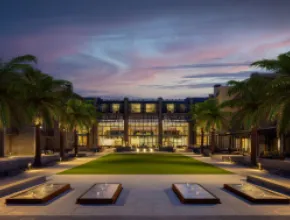The capital of the People's Republic of China, Beijing is the nation's center of government, economy, culture, and, soon enough, the epicenter of the world's attention when the 2008 Summer Olympic Games commence.
As anyone who's recently planned a meeting in Salt Lake City knows, the world’s largest sporting event might mean higher room rates and large crowds during the Games, but afterwards all of that new infrastructure—including new hotels and transportation improvements—stays put long after the roar of the crowd fades away.
Hoteliers are scrambling to open up new hotels before the Olympics, and the government has made an effort to place signs in English around the city so visitors don't get lost and can understand the historic and cultural sites. The authorities are also sprucing up their airport and train system, and have even required restaurants to have menus in English in time for the big show. All of these developments bode well for planners looking at Beijing for a meeting after the Games.
There still might be time to give attendees a chance to see for themselves the excitement of a rapidly modernizing Beijing. For creative planners who have small groups that are adventurous, there are still places to sleep in the capital city this summer.
Getting here shouldn't be too hard--airlines connect Beijing to more than 110 cities in China and abroad, and the recently invigorated train and highway system will ostensibly make getting around a snap.
It's a huge place, though, so a little bit of patience is advised. With a population of 11 million people, Beijing contains 18 districts and counties covering an area of 10,450 square miles. Because of new stadiums going up inside the city, the government plans to build three new suburbs at Beijing's edge to house the people displaced from the massive urban redevelopment.
Visitors to this year's Olympics will find a city that's warm, but not hot. At an average temperature of 79 degrees Fahrenheit, July is the warmest month, compared to January's temperatures, which hover around 24 degrees Fahrenheit. The best time to visit Beijing is May, September and October.
Olympic Park, in the Chaoyang District on the northern edge of Beijing's north-south axis, will be the heart of the Games. To the north lies the Olympic Forest Park, and to the south are a whopping 14 stadiums, the Olympic Village, two media centers, a national sports museum, and a myriad of other facilities. Chinese authorities say that after the games, Olympic Park will become Beijing's biggest mixed-use development—and the city's center of gravity for business and meetings.
The mayor of Beijing, Wang Qishan, recently told a group of journalists that the Olympic Games in 2008 “will leave China and international sports with a unique legacy--presenting a distinctive and high-level Olympic Games is a serious commitment that Beijing has made to the whole world."
For planners, the closing ceremonies might be the most exciting part of the global event—after which hotel rooms are cheaper and plentiful, and when a revamped, visitor-friendly city will welcome groups of all sizes through its hard-won know-how.





